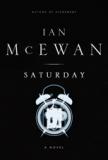No Ordinary Day
Saturday brings Ian McEwan’s novel output to a neat dozen; with one exception, most of them have tended toward brevity rather than length. I have read almost all of them and consider myself a fan. Ironically, McEwan received the Booker Prize for Amsterdam, a short novel of intrigue, while his next novel, Atonement, was acclaimed as his masterpiece to date. It is a powerful story of family, guilt and redemption spanning several decades and a world war. Sometimes the prize-givers jump too soon.
McEwan’s latest novel is in some ways more reflective of his earlier work, a tightly written story, limited to a single day in the life of an upper-middle-class London family: neurosurgeon-husband, lawyer-wife, and two grown children: girl and boy; respectively, a recently published poet and a talented young musician. Just listing them like that may reveal a basic flaw: everything is just a bit too perfect for the Perownes. This particular Saturday finds three of them at home, with the daughter eagerly expected back that evening.
In the morning, however, a chance event sets a counterforce in motion that will affect all of their lives. Henry Perowne wakes unusually early to the sight of a burning aircraft flying over his comfortable home on the way to an emergency landing at Heathrow airport. A few hours later Henry finds himself embroiled in an accident of his own, a sideswipe of his car that enrages the thugs in the offending vehicle. Henry spots the symptoms of a degenerative brain condition in the capo and skillfully uses the information to effect his escape from a likely thrashing with the suggestion of possible medical help. Hitchcock fans will be on the qui vive.
But McEwan has more than a domestic imbroglio in mind. He sets his narrative to coincide with London’s largest-ever political demonstration, a vast protest against Tony Blair’s enthusiastic concurrence in George W. Bush’s decision to invade Iraq. Macrocosm and microcosm meet in Henry, whose own generally pro-war position sharply clashes with that of his daughter, Daisy, returning from France with her first published volume of poetry and strong antiwar convictions. Theo, his son, remains largely apolitical. What makes things all the more painful for Henry is that his own position is hardly hardcore; he even challenges his American squash partner, Jay, who thinks the only moral solution is to get rid of Saddam and democratize Iraq.
The party Henry has organized for the evening has its own “political” agenda. Daisy has become estranged from her poet grandfather, whose sharp needling has long since alienated his son-in-law. The disagreement over Iraq has only heightened tensions. And then just as his wife, Rosalind, returns home from her long day of law, a dark shadow follows. Baxter, the capo from the morning accident, makes his inevitable reappearance, knife in hand, along with an accomplice. The melodramatic note swells.
Daisy is forced to strip, revealing her pregnancy to all, and read a poem, but instead she recites from memory Matthew Arnold’s “Dover Beach,” equally unknown to Baxter and, more surprisingly, to Henry, despite her attempts to educate his literary tastes. Baxter takes the bait, however, and becomes enraptured by the rich sounds. Henry seizes the moment to tempt the assailant upstairs to examine his offer of medical help. From there it is only a matter of finding the right moment, with an assist from Theo, to topple the assailant, whose lieutenant once again has left in disgust. But the play requires another scene to redeem Henry. Having injured Baxter, he must now heal him, and so he does with appropriate surgical bravura.
By this time the pending war seems far from everybody’s mind, and its link to the domestic drama more than a little strained. McEwan’s attempt at a family romance falls a bit flat, unfortunately, though he does succeed admirably in sketching the inner world of a first-class neurosurgeon.
This article also appeared in print, under the headline “No Ordinary Day,” in the July 4, 2005, issue.








